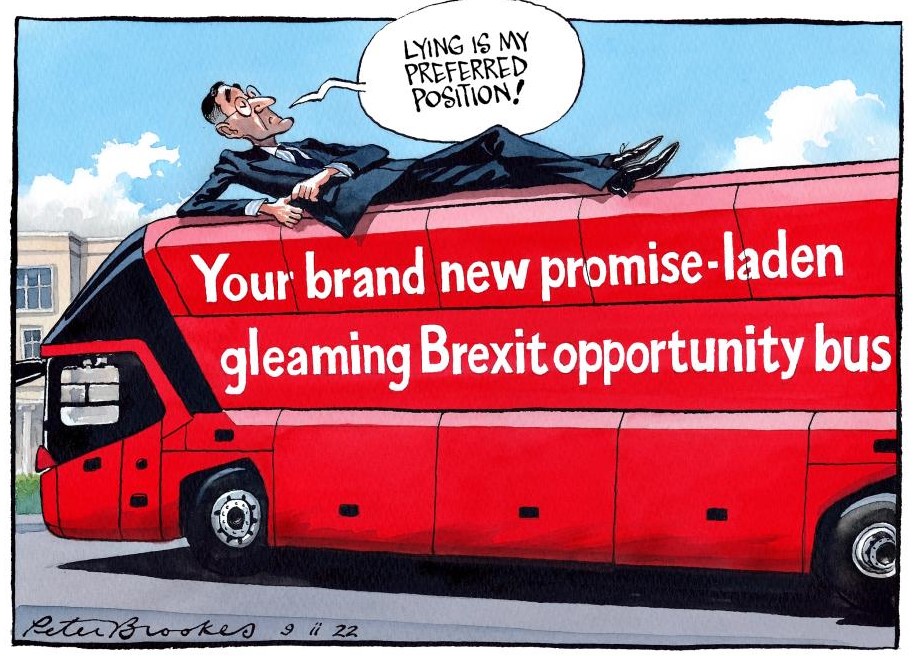| Ideology – how to run a country... | ||
| |
Karl Marx considered Ideology to be the superstructure of a civilization: the conventions and culture that make up the dominant ideas of a society. But in his opinion those ideas were mainly those imposed by the ruling class. And so he came to the conclusion that ideology was a set of deceptive ideas designed by an elite to keep the rest of us in our place. As the father of communism he knew what he was talking about. As it happens, though, talk about elites and their wish to make the rest of us subservient to them is again very fashionable. Liz Truss tells us she was thwarted by the anti-growth coalition meeting around the dining tables of Islington. Trump, Alex Jones of Infowars and many other conspiracy theorists tell us that they are fighting for us against some ill-defined and rarely explicitly named elite. Fortunately, we now see some of their lies backfiring on them, with Trump's multiple court appearances as a prime example. Alex Jones is still broadcasting on his infowars channel but has a $965m damages award against him plus a further $500,000 in punitive damages for repeatedly pushing the lie that the 2012 Sandy Hook school shooting was a hoax and that those involved were actors. Another person telling us about the elites and their wish to control us through use of the Covid vaccine is that rather charming person, Russel Brand. He is accused of multiple sexual assaults but has claimed that his many relationships in his very promiscuous life were consensual. Fortunately he has many friends standing by him down in the conspiracy rabbit-holes, including Donald Trump, Alex Jones and Elon Musk. So he should be fine. I don’t think Liz has expressed an opinion yet. Obviously ideology coupled with charisma can be used to entrap the gullible, but Marx’s description seems to me to be a bit limited. The Sermon on the Mount put forward an ideology, but not a set of ‘deceptive ideas designed to keep us in our place’. Of course, what came long after Jesus had disappeared, would fit Marx’s description: all state-backed religions have as their purpose the control of the people. And I’m not sure either that it’s fair to accuse, for example, all political parties of peddling deceptive ideas in order to keep us in our place. In its purest form, an ideology is simply a view of how the world (or at least our corner of it) should best work for our society. And such a view can be honestly held. Ideologies do however generally suffer from the difficulty that they are, by their nature, designed to be all-encompassing in their description of how things should be. Rather like the grand unified theory in physics. And we know that doesn’t work. Those supporting an ideology do not necessarily intend to cause harm and, normally, want good for society. Unfortunately, however, most people aren’t keen on poring over detail and so, in order to catch on, ideologies need to be a greatly oversimplified view of the complexities of life: how we can best live our lives summed up in a few catchy phrases. Once analysed, however, they inevitably come up short. Liberté, fraternité, égalité sounds good, but do we really want equality? And if so, equality of what? Opportunity? How do we address genetic differences in abilities? Or is it equal outcomes? Pay everyone the same and provide identical accommodation for everyone? A bit against human nature. In fact, these days, the buzzword in France is ‘solidarity’, although no-one really knows what it implies. There are additional difficulties though when, as part of that ideology, people of other views are accused of acting in order to gain an unfair benefit for a particular social grouping of which they are part. Reading comments after newspaper articles or looking at X is not really good for my health, but when I do I almost always find that anything to do with a decision by the present UK government spawns accusations that it was made in order to line the very deep pockets of its rich supporters. As the PPE scandal has shown, it does happen, but to generalise from that to all decisions is unjustified. Currently the whole catastrophe which is HS2 is under attack. It was designed to be a high speed rail connection between central London and central Birmingham which will now directly connect to neither. But wa  s its main
purpose to line the pockets of the big companies
trying to build it? May it not instead have been
the background of hopeless indecision on the part
of successive governments which has led us to
where we are? s its main
purpose to line the pockets of the big companies
trying to build it? May it not instead have been
the background of hopeless indecision on the part
of successive governments which has led us to
where we are? Incompetence rather than conspiracy. Likewise, when Labour was in power, the accusation was always that decisions were made at the behest of their paymasters, the big unions. And of course sometimes they really were, but by no means always. Many conservatives resist the idea that they have an ideology, saying instead that they have ‘values’. Left and right though each have their version of panaceas to the challenges of a modern state. For Labour these usually come down to tax and redistribution versus, for the Conservatives, tax cuts and a smaller state – Liz Truss, we’re looking at you. Her car crash budget was a perfect example of how ideology can lead politicians astray when the realities of life are neglected. So then, as we find out so often, actually implementing an ideology is not that simple. And although frequently promised, fortunately neither of the main nostrums has ever been fully applied in the UK. In fact, the most recent attempt to impose the Conservative ideology on the country was Brexit. That's gone well. It tried to reduce the size of the state by removing Brussels from the governance of the UK. By casting off the dead hand of the European Union, Britain would, with one bound, become a great power and th  rive as it had
before (?). ‘Take back control’ became the mantra
for 17m voters in search of something, anything,
better. rive as it had
before (?). ‘Take back control’ became the mantra
for 17m voters in search of something, anything,
better. Max Weber, (the German political scientist) observed that good politics takes passion but it also takes perspective. Brexit produced a lot of passion, but no vision of how to deliver what it promised. Not surprisingly, the imagined benefits of Brexit proved illusory. However, it was no more irrational than Jeremy Corbyn's Marxist belief that a state taking control of the economy is the ideal. So, for many of us, the last election was decided not on hope for the future, but on the basis of fear of what the actual implementation of one of the two different ideologies would produce. And Brexit won because we Remainers believed them when they said they wanted to stay within the single market; that they did not want what has actually become an ultra-hard Brexit driven by ideology. Many years ago, the philosopher Sir Isaiah Berlin spoke of those who take ideas from many different sources. They are relatively comfortable with some degree of confusion and ambiguity in the world. And, he said, the world should appear to be like that, granted that we don’t actually know how it works. Others, however, see the world through a single, all-embracing view of how it works. Which means that they have to fit their perception of events into their narrow mental narrative. It is not really subject to change in the light of their experience: instead, their understanding of that experience is changed, distorted to suit how they think things are. Unfortunately, party politicians and supporters who actually belong to a party, are motivated mainly by their ideological views. And so they fit more naturally into the second category, the all-embracing view. Which is a shame: their ideology makes it difficult to learn from experience and so, paradoxically, they are by definition unfit to govern. But do our prospective leaders for 2024 actually have ideologies? Well, Starmer has changed radically. On his entry into the shadow cabinet he told us that he was an avowed Corbynista. A former DPP as Marxist. Now, as leader of the party he is receiving praise from Tony Blair. So then not so much the holder of a fixed view as a political chameleon. Sunak’s vision, if he has one, appeared until recently to be that of balancing the books. Now though we see another Sunak, one who makes a virtue of abandoning long-standing policies in order to free us from so many constraints, real and imaginary – 7 recycling bins anyone? So then not apparently an ideologist either. But granted that both have made such radical changes in their views and promises, neither can actually be depended on to implement any of their forthcoming manifesto commitments... Awkward. 25 September 2023 Paul Buckingham |
|
|
|